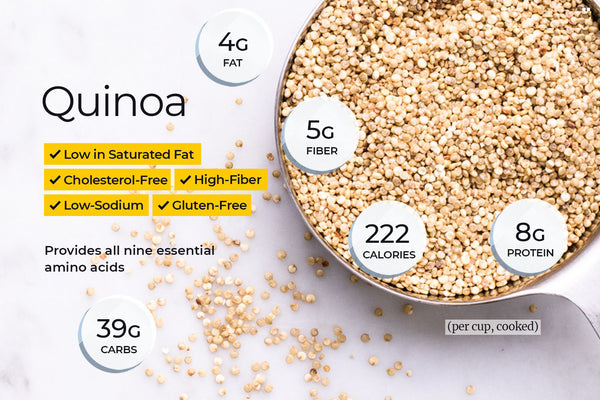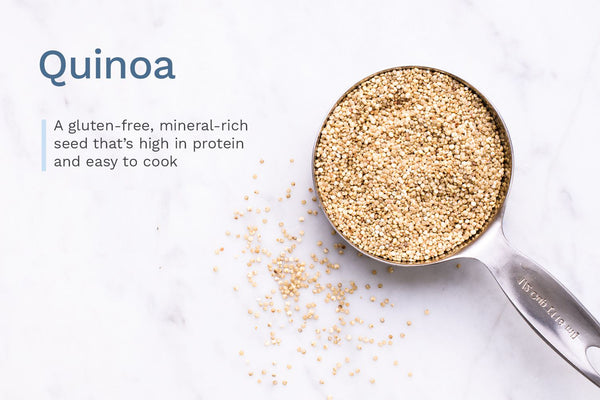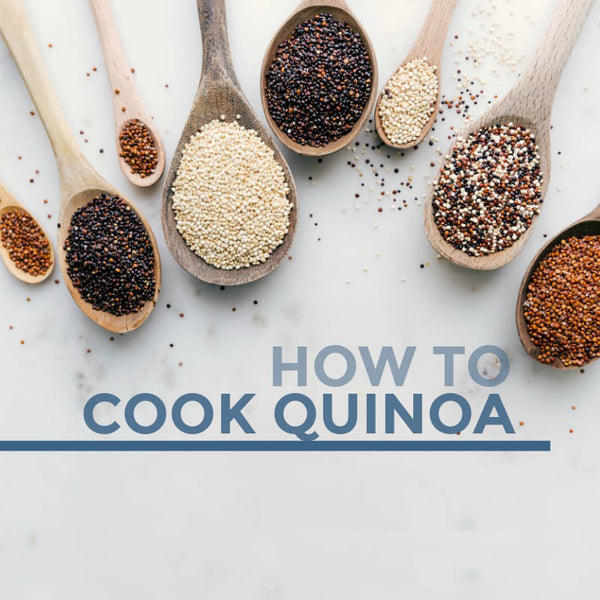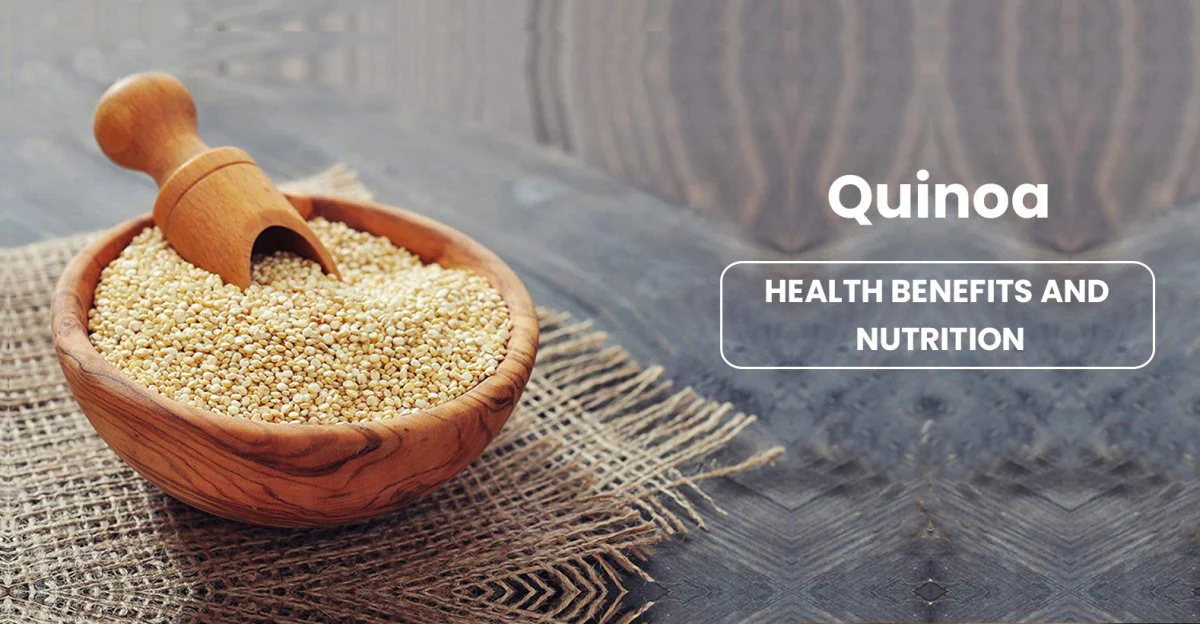Everything you need to know about Quinoa Health Benefits and Nutrition:
What is Quinoa?
In recent times Rice used to be the sole grain available in today's town, and not any longer. Quinoa has gained a reputation as a nutritious choice. In numerous dishes, it has already replaced Rice. Quinoa, sometimes known as a superfood or super grain, has been increasingly popular in recent years due to its health benefits. Quinoa is a grain that is eaten like a grain and is frequently used as a rice alternative. Chenopodium quinoa is the source, and both the leaves and seeds of this nutritious plant are edible. Quinoa is high in energy and low in calories, making it beneficial to the human body in various ways. This nutrient-dense cuisine is high in protein, fiber, antioxidants, and various vitamins and minerals. So this chapter tells you all you need to know about Quinoa.
Nutritional Facts of Quinoa:

Quinoa has 71.6 percent water, 21.3 percent carbs, 4.4 percent protein, and 1.92 percent fat when cooked.
Calories in Quinoa: Cooked Quinoa has 222 calories per cup (185 grams).
The following are the nutritional values for 3.5 ounces (100 grams) of cooked Quinoa.
- Water- 72 percent
- Calories- 120
- Carbs- 21.3 grams
- Protein- 4.4 grams
- Fiber- 2.8 grams
- Sugar- 0.9 grams
- Fat- 1.9 grams
Fiber in Quinoa:
- Quinoa, like brown Rice and yellow maize, is a good root of fiber when cooked.
- Fibers make up 10% of the dry weight of cooked Quinoa, with insoluble fibers like cellulose accounting for 80–90% of that.
- Insoluble fibers have been linked to a lower risk of diabetes. In addition, certain insoluble fiber, like soluble fiber, may be fermented in your stomach, feeding your friendly bacteria and supporting greater overall health.
Carbs in Quinoa:
- Cooked Quinoa has a carb content of 21%, which is comparable to barley and Rice.
- Starches account for about 83 percent of carbs. The rest is primarily fiber, with a minor amount of sugars (4%) such as maltose, galactose, and ribose thrown in for good measure.
- Quinoa has a low glycemic index of 53, indicating that it will not produce a quick rise in blood sugar levels.
- The glycemic index is a range of how fastly blood sugar levels rise after a meal. Obesity and a variety of diseases have been linked to high-glycemic foods.
Protein in Quinoa:
- Proteins are made up of amino acids, which are the building blocks of all of your body's tissues.
- Some amino acids are deemed essential because your body cannot make them, so you have to get them from your food.
- Quinoa contains 16 percent protein by dry weight, which is more than typical cereal grains like barley, rice, and corn.
- Quinoa is classified as a complete protein source, meaning it contains all nine essential amino acids.
- It has a high concentration of the amino acid lysine, which is normally absent in plants. It also contains huge levels of methionine and histidine, making it a good plant-based protein source.
Minerals and vitamins:
Quinoa contains more magnesium, iron, fiber, and zinc than many other grains, making it a good source of antioxidants and minerals.
Quinoa's main vitamins and minerals are listed below:
Phosphorus- This mineral, commonly found in protein-rich diets, is necessary for bone health and the preservation of many bodily tissues.
Copper- A mineral that is typically deficient in the Western diet, is essential for heart function.
Manganese- This trace mineral, which is abundant in whole grains, is necessary for metabolism, growth, and development.
Folate- It is a B vitamin necessary for cell function and tissue growth, and it is mainly crucial for pregnant ladies.
Iron- It is a crucial mineral that helps your body accomplish various important tasks, including delivering oxygen in red blood cells.
Zinc- This mineral is essential for overall health and is involved in various chemical reactions in the body.
Health Benefits of Quinoa:

Quinoa is a nutrient-dense grain that is high in minerals and plant compounds, and it can be a powerful supplement to your go-on diet. According to some research, Quinoa can help you get more nutrients and lower your blood sugar and triglycerides.
May lower the risk of chronic disease:
Quinoa contains a high concentration of anti-inflammatory phytonutrients, making it potentially beneficial for human health in terms of illness prevention and treatment. Quinoa has a higher proportion of monounsaturated fat than most cereals and has a tiny amount of heart-healthy omega-3 fatty acids.
Enhances gut health:
Quinoa has been shown to promote gut health by increasing the diversity of good gut bacteria and reducing the inflammatory symptoms associated with illnesses like colitis. Quinoa acts as a prebiotic, providing fuel for good intestinal bacteria, allowing them to flourish.
May helps weight loss:
Quinoa has a number of qualities that make it good weight-loss food, and it contains more protein than foods like Rice, corn, and whole wheat. Protein is an important component of weight loss since it increases metabolism and feelings of fullness, and it may thus aid in the prevention of obesity and related disorders. Fibers are also beneficial for weight loss since they increase feelings of fullness and improve gastrointestinal health, resulting in lower calorie consumption.
Lower blood sugar levels:
People with Type 2 diabetes are characterized by an inability to use insulin efficiently, resulting in high blood sugar levels and various problems. Refined carbohydrates have been related to an advanced risk of both diabetes and heart issues, but whole grains like Quinoa have been linked to a lower risk. Quinoa consumption dramatically reduced blood cholesterol, triglycerides, and blood sugar levels in rats fed a high-fructose diet, all of which are connected to diabetes. Quinoa was compared to standard gluten-free wheat products in one human trial. Quinoa reduces triglycerides and free fatty acids in the blood, and it also has a smaller impact on blood sugar levels than gluten-free pasta and other foods.
Enhance metabolic health:
Quinoa is a beneficial food for metabolic health because of its nutrients. One of the key benefits of Quinoa, according to research, is that it improves metabolic health by lowering insulin, blood sugar, and lipid levels.
Easy to digest:
Quinoa provides 21 to 22% of the necessary daily fiber consumption in a single cup portion, which is far greater than its other competitors. Fiber-rich foods help to aid digestion and make you feel fuller.
Gluten-free:
Gluten, the most reviled of all the dietary groups, has gotten a terrible rap in recent years. In fact, one-third of individuals are attempting to cut back on gluten, which is one of the reasons Quinoa is gaining popularity. Similarly, choosing Quinoa over gluten-free staples like refined tapioca, potato, maize, and rice flour can significantly boost your diet's nutritional and antioxidant content.
How to Cook Quinoa:
Quinoa recipes:

Quinoa is an excellent salad foundation because it can absorb dressing without getting mushy. Quinoa makes a great bed for chicken, fish, or grilled vegetables as a savory side dish. It must, however, be made properly, or it will taste bitter.
Quinoa with shallots, lemon, and herbs:
This Everyday Quinoa with Lemon, Shallot, and Herbs is a go-to side dish that goes with everything. It is one of the favorite quinoa dishes because it is vegan, gluten-free, and flavorful.
Broccoli Quinoa cakes:
These Broccoli Quinoa Cakes are flavorful and filling, with a great texture. Make them ahead of time and reheat them for a delicious healthy quinoa recipe that the whole family will enjoy.
Chickpea quinoa veggie burger:
Thanks to its nutritional ingredients, this Chickpea Quinoa Veggie Burger is full of great savory taste and satisfying texture. It is delicious with a variety of toppings, and it is Vegan-friendly, vegetarian, and gluten-free.
Why Quinoa is preferred over rice: Which is healthier?
- Both Quinoa and rice have a role in a balanced diet, and it is reasonable to say. Quinoa and rice are both adaptable and nutrient-dense foods, so that you may eat Quinoa one night and brown rice the next.
- Scale and variety are the solutions to a well-balanced diet. To enjoy the differences in flavors and nutritional content, include Quinoa regularly for best nutrition.
- All dietitians, however, believe that Quinoa is the best choice and includes more health benefits. Quinoa is a better alternative than brown rice for individuals wishing to add extra plant-based protein to a meal.
- Quinoa is also a few plant foods that include all nine essential amino acid insufficient levels. Rice, on the other hand, is mostly carbs. Quinoa is the more nutritious option because of its amino acid, fiber, and protein levels.













